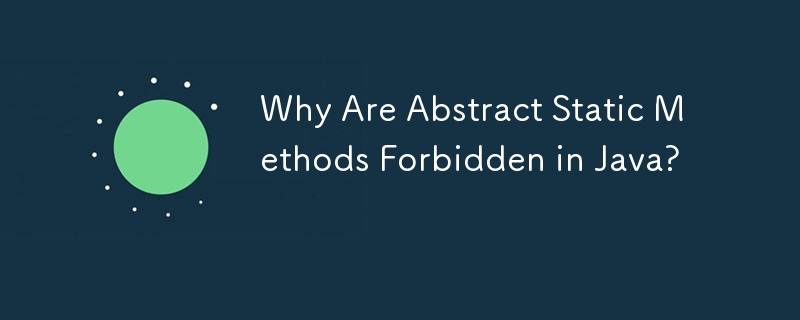

Abstract Static Methods in Java: Why They're a No-No
In Java, abstract methods and static methods are two important concepts. One defines an unimplemented contract that subclasses must fulfill, while the other allows access to shared functionality without instantiating an object. However, an attempt to combine these two concepts into an "abstract static method" raises an intriguing question: why is it forbidden?
Abstract Methods and Static Methods: Contrasting Natures
Abstract methods are declared with the keyword "abstract" and do not define any implementation. They serve as placeholders for concrete methods that must be defined in subclasses. This ensures that all subclasses provide a consistent interface and behavior.
On the other hand, static methods are declared with the keyword "static" and are bound to a class rather than an object. They can be called even without creating an instance of the class and are typically used for utility functions or constants.
Abstract Static Methods: An Incompatible Mix
When contemplating an abstract static method, we encounter a fundamental logical contradiction. An abstract method suggests an unimplemented contract, while a static method implies inherent functionality. It is impossible to have an unimplemented method that also has a fixed implementation.
To illustrate this, consider the following invalid code:
abstract class foo {
abstract void bar( ); // <-- This is allowed
abstract static void bar2(); // <-- This is not allowed
}The method bar() can be abstract because there's no fixed implementation. Subclasses will provide their own concrete implementations. However, bar2() cannot be abstract and static simultaneously. Being abstract would imply no implementation, while being static would imply the existence of functionality bound to the class.
Conclusion
In Java, the concepts of abstract methods and static methods are distinct and mutually exclusive. Abstract methods define an unimplemented contract for subclasses, while static methods provide class-level functionality. Attempting to create an abstract static method creates a logical inconsistency, as it would imply a method that is both abstract (unimplemented) and static (has fixed implementation). Thus, in Java, the combination of "abstract" and "static" for methods remains forbidden.
The above is the detailed content of Why Are Abstract Static Methods Forbidden in Java?. For more information, please follow other related articles on the PHP Chinese website!




